- Home
- Tamora Pierce
Circle Opens #03: Cold Fire Page 11
Circle Opens #03: Cold Fire Read online
Page 11
He grinned. “I’m ravenous,” he admitted. “And for the first time since I came here I feel warm.”
Daja shook her head and went back to collect her poles.
In spite of the morning’s disturbance and their reluctance the night before, Jory and Nia were in the schoolroom when Daja arrived. No fires were lit in the hearth: wool dresses and stockings or no, the twins’ breaths steamed on the chilly air.
“I can’t sit like this,” Jory informed Daja. The twins were shivering. “We’ll freeze.”
“You’re not sitting,” Daja said. She tossed a pole to Nia, who caught it easily, and another to Jory, who nearly dropped hers. She placed her own pole against the wall.
“I thought you said we wouldn’t have staffs,” Nia said, running her hands over her pole.
“You won’t need a staff as a mage,” Daja replied. “You —”
“Does he always sit in fires naked?” asked Jory. “Are we going to learn how to do that? And why’d he pick the name Frostpine if he hates being cold?”
Daja had asked him the same thing, as they huddled in a mountain travelers’ hostel during a late summer blizzard. To Jory she repeated his answer: “He said he hadn’t thought cold got so very cold, and he thought frostpines must be pretty trees. Neither of you will be sitting naked in any fires.”
Nia shuddered. “Oh, please!” she whispered. “I have nightmares about fire!”
Daja patted her shoulder. “Once your magic’s under control, you’ll feel less like you’re actually made of wood,” she said gently. “You’ll be able to seal yourself off from your magic. The dreams will stop then. Now,” she said before they could interrupt again, “we’ll start with some easy first moves with the staff.”
“But how —” Jory began.
“Just do as I say,” Daja told the girl sternly. Jory nodded, mute.
She didn’t mean to make fighters out of them, but if she was going to do this, she ought to do it properly. Otherwise her next dream of Skyfire might end as he trounced her for slipshod teaching. She taught the girls how to properly grip the staff and how to stand to keep their balance. Then she showed them the high strike and its defense, the high block, the body strike and its defense the body block, and the low strike and block. Next she gave them a sequence, high, middle, low. Jory struck first as Nia blocked; after they had done five sets, Daja switched them so Nia struck Jory’s blocks. They didn’t hit hard. It was more important at this point to hit and block correctly. They repeated the sequences over and over until both girls showed beads of sweat at the temples. As they got more confident, they picked up speed.
Jory began to hit too hard. Nia shrank a little at each blow. When it was her turn to strike, she tapped Jory just as she had at first. When Jory became striker again, she was impatient. She brought her high strike down with all her strength behind it. Nia cringed. As Jory launched her middle strike, Daja thrust her own pole in and knocked Jory’s staff aside. Nia backed up.
“Keep control of your feelings,” Daja told Jory. “You can’t get excited. You have to pull that in. And you can’t shrink away,” she told Nia. “Keep the rhythm going. Don’t worry about anything but doing the same moves over and over.”
“But I hate to hit, and I hate being hit,” protested Nia. “Why can’t we meditate like before?”
“I hated that,” Jory told her. To Daja she said, “I’ll be good. Just do the things, and hit nicely, and not get excited.”
“Pay attention to the pattern and to the way your body works,” Daja said. “That’s all. Nobody’s going to hurt you, Nia. This is just a pattern, like the breathing, only with all of your body. All right, you strike, Jory blocks, high, middle, low, then switch. Begin.”
They obeyed, striking and blocking slowly, as they had at first. Little by little they relaxed. Daja watched carefully, noting when they began to speed up. Jory started to grin. Faster they went. Jory hit harder; Nia began to flinch. Then, as Nia struck high, Jory blocked and swung a middle strike at her sister’s ribcage. Daja, expecting it, slid her own pole in, hooked Jory’s, and sent it flying. After another lecture to Jory about emotions, Daja started the twins a third time. It was no good; after a minute she saw that Nia didn’t believe her sister’s promise to control herself. She flinched every time Jory struck her, even though she blocked Jory.
When the breakfast bell rang, the twins looked at Daja. She held out her hand for their poles. Nia thrust hers at Daja and fled. Jory gave her pole up reluctantly. “I’d get better,” she told Daja. “Only I suppose you’ll want to go back to the boring way now.” She ran out of the schoolroom.
Daja chose not to eat with the family. A burned scent in the air told her that breakfast cooked by a half-terrified staff was something she could give up. Instead she dressed for the outdoors, picked up her real staff and the satchel that held her tracings of Ben’s hands, and set out for Teraud’s smithy. Halfway down Tenniy Street an old woman made almost perfectly round by skirts and shawls sold dumplings from a cart. Daja bought herself breakfast there and strolled on, turning her problem over in her mind.
Nia liked to sit and meditate. Jory concentrated best when she was moving. No matter how many times Daja put those facts into the forge to heat, they always came out in the same shape.
That’s magic for you, she thought gloomily. One part glory, one part fun, and one part polishing the brightwork till your back and your knees and your hands all ache.
Then she chuckled. Sometimes her old seafaring life broke into her thoughts at the oddest moments. She also took the lesson. Brightwork got ruined by rust without plenty of scrubbing. The twins would never get the best out of their power if Daja was a lazy teacher. Work was work: it had to be done right.
7
If Teraud Voskajo was not the ugliest white man Daja had ever met, she had mercifully forgotten the uglier man’s appearance. Stringy brown hair barely covered his blocky head. Dark eyes peered out from under a shelf of brow. His nose was mashed; a slab of chin jutted out beneath a thin mouth. His arms were mallets of muscle and bone. He was six-and-a-half feet tall.
Every child in the neighborhood knew the man who looked like a monster would do anything, from rescue kites to give coins for sweets. Girls told him their love troubles; young men asked his advice on dealing with their fathers. He was a leader of the smith’s guild in Namorn and knew more of working iron than even Frostpine. He was not a mage.
He had been delighted to give Daja forge-time in exchange for her assistance with some of his projects. With him she studied fine ironwork, shaping metal into lacelike forms: between the Syth and the Pebbled Sea, Teraud was the best at it. As a successful master smith Teraud supervised nearly twenty apprentices and journeymen in his massive Hammer Street forge.
Before she entered Teraud’s, Daja took a moment to look at the canvas-covered sleigh in the courtyard. The sleigh belonged to Kugisko’s governor. It was a glory of brasswork, enamel paint, and gilt moldings. All it required was runners; those were nearly finished. Today she and Teraud would harden the long metal pieces that would be shaped to create two silvery, elegant lengths of metal that would cut through ice and snow. If all went well, they could temper the steel the next day, and fit the runners the day after.
Once inside, she laid her Trader’s staff against the wall of the coatroom, then hung her satchel and outer coat over it to hide the telltale brass head from view. While none of Teraud’s people had spoken against Traders, it was silly to flaunt her people’s best-known symbol. She stuffed her scarf, gloves, and knit hat into her coat and worked off her fur-lined boots, replacing those with leather shoes.
“You ready to work?” Teraud stood in the doorway, tying on his leather apron. His family had been miners in the hard lands north of the Syth; he had still not shed the accent after thirty years on its southern shore. “Teaching didn’t wear you out?”
Daja grinned as she found her own leather apron. “How does anybody have a private life on this island, the way serv
ants gossip?”
Teraud chuckled as he led the way to his forge. “The whole city prob’ly knows you teaching dose girls by now,” he teased. “Our servants are good at da gossip.”
Between stretches when the metal heated to the proper brownish yellow shade for hardening and Teraud checked his apprentices and journeymen, Daja worked on the iron rods she used for so much of her own work. That morning she took extra care, shaping her rods with her power as much as her drawing tongs. These would be the foundation of Ben’s gloves.
The morning flew past. Daja was startled when Teraud’s wife called them to midday. She stowed her tools as the journeymen and apprentices headed for the dining room in a fast-moving herd.
Once inside, apprentices at one long table and journeymen, Teraud, and Daja at another, everyone fell on their loaded plates. Unlike plenty of masters, Teraud made sure his people were well fed. He’d once told Daja it was just self-interest — happy workers meant better work.
The meal was half-over when a maid showed in a boy who carried a sealed sheet of parchment. She pointed Daja out. As he approached, Daja saw he wore the Ladradun insignia on the shoulder of his threadbare gray coat. He was trying not to stare at the laden table. Mutely he offered his message to her.
She took it and signed for him to wait, digging in her pocket for a silver argib as a tip. He looked half-starved. She hoped he’d buy himself something to eat before he returned home.
“Better read dat careful, make sure you don’t need to send back no answer,” Teraud advised her. He speared a thick slice of roast pork with one hand as he scooped up two slabs of bread with the other. He dropped the meat onto one piece of bread, capped it with the other, and thrust the whole at the boy. “My wife cooks too much,” he growled. “Eat before it goes bad.”
The boy didn’t need encouragement. He clutched the offering with both hands and took a huge bite. Daja slowly cracked the seal and read the few lines of Ben’s note. It was his answer to her request for a time to fit him for the gloves. If it wasn’t too late when she finished at Teraud’s, he wrote, she could find him at the Ladradun warehouses on Bazniuz Island, at the joining of Cashbox Street and Covil Way.
She read it three times before the boy finished what he’d been given and accepted a second bread-and-meat slab from Teraud. Then she gave the messenger her argib and said, “Tell Ravvot Ladradun I will see him later this afternoon.”
The boy nodded, still chewing, and trotted away. Teraud’s wife Nushenya came over, shaking her head. “The way that woman stints on food, you’d think every grain of wheat was taken from her own children,” she said to her husband. “She whips them, you know. The servants. The island council fines her — she doesn’t care.” She glared at the journeymen, openly eavesdropping. “Don’t think any of you are too big for a whipping. I saw that vegetable plate! A vegetable plate goes back half-empty at supper and we serve what you turn away instead of meat tomorrow!”
Daja ducked her head to hide a smile as the diners, male and female alike, dug into eggplant and carrots.
“Somet’ing’s not right at dat house,” Teraud commented as he sat back and dug at his teeth with a toothpick. “Morrachane’s half crazy.”
Daja put her fork down. “But what about Ben? He’s all right isn’t he?”
“He’s a hero,” insisted a young journeywoman. “That carriage shop on Rider Street would have burned last winter —”
“The hat shop on Stifflace Lane,” someone else put in.
“Emperor Noodles,” called a girl apprentice.
“If you can talk you can work,” Teraud said. Apprentices and journeymen left the tables to wash up and walk around a bit before they returned to their tasks. Only Daja remained with Teraud at the table. His wife joined them with sturdy mugs of honeyed tea. She was from Capchen, where tea was drunk in the way Daja expected it to be drunk. She too sat with her husband, willing to let the maids clear the tables.
“Call me a grumpy old man wit’ a nose full a soot and a copper-coated tongue,” Teraud said over his toothpick. “To hear da world tell it, Ben Ladradun’s de only good dat family ever gave Kugisko.” He shook his blocky head. “Me? If somet’ing like a fire took my joy” — he engulfed his wife’s hand with one of his own — “I wouldn’t go hunting da t’ing dat took my sweetheart and my children.” He sighed and looked into his mug, then drained it.
Daja followed him back into the main forge. Ben’s intense focus on fire didn’t seem odd to her. She had seen Tris destroy part of a fleet because those who sailed with it had murdered her cousin. Sandry had battled her terror of the dark to keep her friends alive. Briar had plunged into death rather than let go of his beloved teacher. Dreadful events, in her experience, led people to do extraordinary things. It made sense to her that Ben would devote his life to a war on fire. Maybe Teraud just didn’t know the kind of people she did.
It was mid-afternoon when Daja left Teraud’s forge, staff in hand, a bundle of slender iron rods and her rolled parchment tracings of Ben’s hands in her satchel. Outside it seemed warmer than it had that morning. Despite there being two more hours until sunset, the light was going. Masses of clouds like fat gray moonstones slid by overhead, their edges fuzzy and soft. After weeks in the mountains and months in the north, Daja knew snow clouds. These looked serious.
With her satchel over her shoulder, Daja strode briskly along Kategan Way, testing the ground with her staff where she suspected hard ice lay under the snow, and dodging sleighs and riders. She could risk her life to cross to Bazniuz on foot, or she could risk her life to hire a sleigh: they all seemed to be driven by madmen. I have to practice skating, she thought as a sleigh hurled slush on her boots and coat. I don’t care how much I ache, it will be worth it.
She did take in the vividly painted storefronts and fences along the way. Color was a Namornese obsession. Roofs were trimmed in yellow, scarlet, emerald green. Outside walls were blue, red, pink, and orange. Doors were bright enough to startle. It was hard to believe that Sandry, whose taste in color was perfect, was half-Namornese.
By the time Daja stepped onto Bazniuz Island, the lamplighters were out. As she walked down Sarah Street, shopgirls and boys left their businesses for the walk home. When she turned north on Cashbox Street, fat snowflakes began to drift idly through the air, as if they toured the city.
Reaching Ladradun Furriers, Daja halted. The property included most of the block on which it stood, expensive on the islands that made up half of Kugisko. The sprawling wooden complex of buildings marked with the Ladradun emblem included a large warehouse, a furrier’s shop, a workshop from which men and women dressed like common laborers streamed, a courtyard where men put covers on wagons against the snow, and the charred remains of a second warehouse. For a moment she had the fanciful idea that the fire gods were vexed, to visit a man who dedicated his life to destroying their work. She made a face and shook the idea from her head: that was Tris’s or Sandry’s kind of addled, imaginative thinking, not hers.
The shop that fronted on Cashbox Street was a haunt for the rich. Luxuriant pelts were draped in its many-paned window, an invitation for buyers to come and touch. That polished cedar door, inlaid with ebony and white pine, was not for the likes of Daja. She walked around the corner. Beside the courtyard gate was an ordinary door and a sign: LADRADUN FURS: TRADESMEN ONLY. She entered that way.
Inside was a typical clerks’ office: long, tilted desks and benches for seats. Account books lined a wall. Lamps with brass reflectors supplied light for those who kept the company’s records. A hearth on one wall was the only supply of heat; the amount it gave off was meager. Everyone, even the chief clerks, wore outdoor coats.
The messenger who had come to Teraud’s sat by the door, whittling a stick into kindling. He jumped to his feet when he saw her. “Viymese Daja, Ravvot Ladradun’s expecting you,” he greeted her. “This way.”
“A moment.” Daja bent to tug at her boot, as if it had twisted on her foot. She thrust deep into th
e ground with her power, passing through stone and watery mush, then granite, until she reached the earth’s hot lifeblood of molten stone.
Straightening her other boot, she called the heat up to her, letting it pass through the wooden floors sheathed in her magic to keep the boards from catching fire. Opening her right hand she spread her fingers. Warmth streamed through her to settle into any metal in the clerks’ office that could hold it: the heavy iron grate, the andirons and pokers of the hearth, the empty metal coal bucket, and the brass lamp reflectors. She gave the metal just enough heat to warm the air without changing the metal’s color. The workers might not realize they were more comfortable, but she knew. It was her slap at Morrachane’s copper-clutching fingers.
She cut the flow of heat and let the rest fall into the molten rock again. One second more she waited, to ensure the metal in the office would not burn the wood around it. She had done something here. Content, she straightened and stamped her feet, as if to make sure her boots were comfortable. “I see you had a building fire outside,” she commented as she followed her guide down the hall to the rear offices.
“A month ago. It wasn’t serious.” He stopped at a closed door and faced Daja, swallowing hard. “Viymese, you gave me too much money.” He held out a silver coin. “You being foreign, maybe you don’t know — the likes of me gets a copper argib, not a silver. If we gets anything.”
Daja smiled. “I bet that honest streak pinches you, doesn’t it?” she asked. She couldn’t imagine Briar correcting anyone about such a mistake. “Don’t be silly,” she added. “You had to skate around two islands, both ways. Someday when you have a bit extra, give it to one who needs it.”
The boy shook his head. “And I always heard southerners are tightfisted. Griantein shine on your winter, Viymese,” he said, naming the Namornese god of light and warmth. He rapped on the door, then opened it. “Ravvot Ladradun, Viymese Kisubo is here.” He bowed Daja into the room, then returned to the clerks.

 Lady Knight
Lady Knight Street Magic
Street Magic Bloodhound
Bloodhound Magic Steps
Magic Steps Alanna: The First Adventure
Alanna: The First Adventure Emperor Mage
Emperor Mage The Will of the Empress
The Will of the Empress The Realms of the Gods
The Realms of the Gods In the Hand of the Goddess
In the Hand of the Goddess Tris's Book
Tris's Book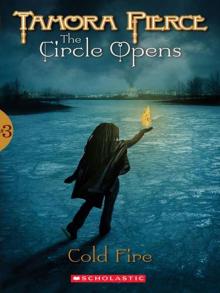 Cold Fire
Cold Fire Sandry's Book
Sandry's Book Wild Magic
Wild Magic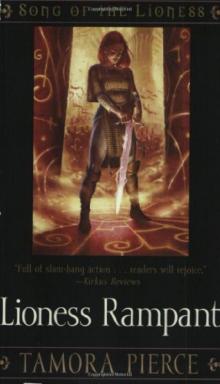 Lioness Rampant
Lioness Rampant The Woman Who Rides Like a Man
The Woman Who Rides Like a Man First Test
First Test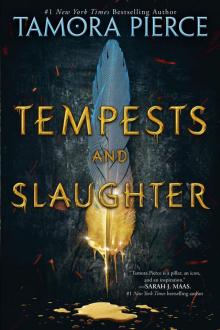 Tempests and Slaughter
Tempests and Slaughter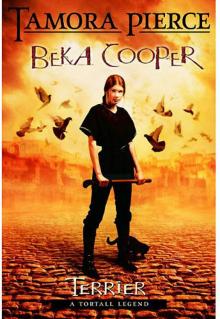 Terrier
Terrier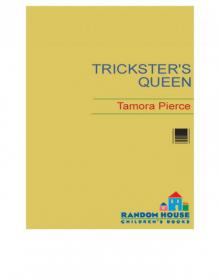 Trickster's Queen
Trickster's Queen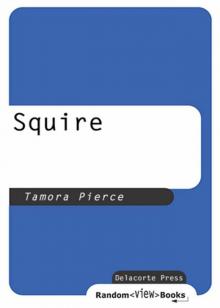 Squire
Squire Briar's Book
Briar's Book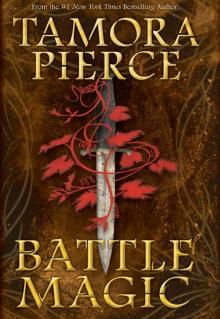 Battle Magic
Battle Magic Page
Page Melting Stones
Melting Stones Wolf-Speaker
Wolf-Speaker Mastiff
Mastiff The Song Of The Lioness Quartet #1 - Alanna - The First Adventure
The Song Of The Lioness Quartet #1 - Alanna - The First Adventure The Circle Opens #2: Street Magic: Street Magic - Reissue
The Circle Opens #2: Street Magic: Street Magic - Reissue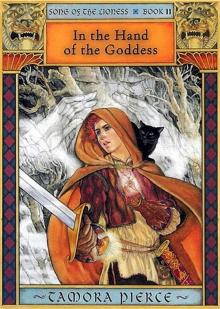 Tortall 1 - Song Of The Lioness #2 - In The Hand of the Goddess
Tortall 1 - Song Of The Lioness #2 - In The Hand of the Goddess Protector of the Small Quartet
Protector of the Small Quartet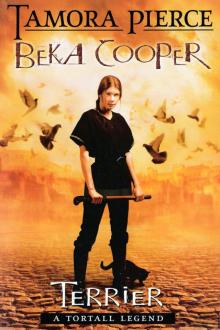 Beka Cooper 1 - Terrier
Beka Cooper 1 - Terrier Alanna
Alanna Trickster's Choice
Trickster's Choice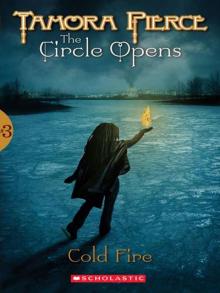 Circle Opens #03: Cold Fire
Circle Opens #03: Cold Fire In the Hand of the Goddess (The Song of the Lioness)
In the Hand of the Goddess (The Song of the Lioness)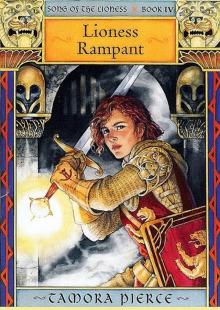 Song of the Lioness #4 - Lioness Rampant
Song of the Lioness #4 - Lioness Rampant Young Warriors
Young Warriors Tortall
Tortall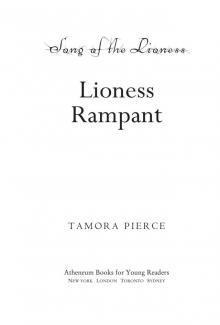 Lioness Rampant (Song of the Lioness)
Lioness Rampant (Song of the Lioness) Melting Stones (Circle Reforged)
Melting Stones (Circle Reforged) The Circle Opens #4: Shatterglass
The Circle Opens #4: Shatterglass